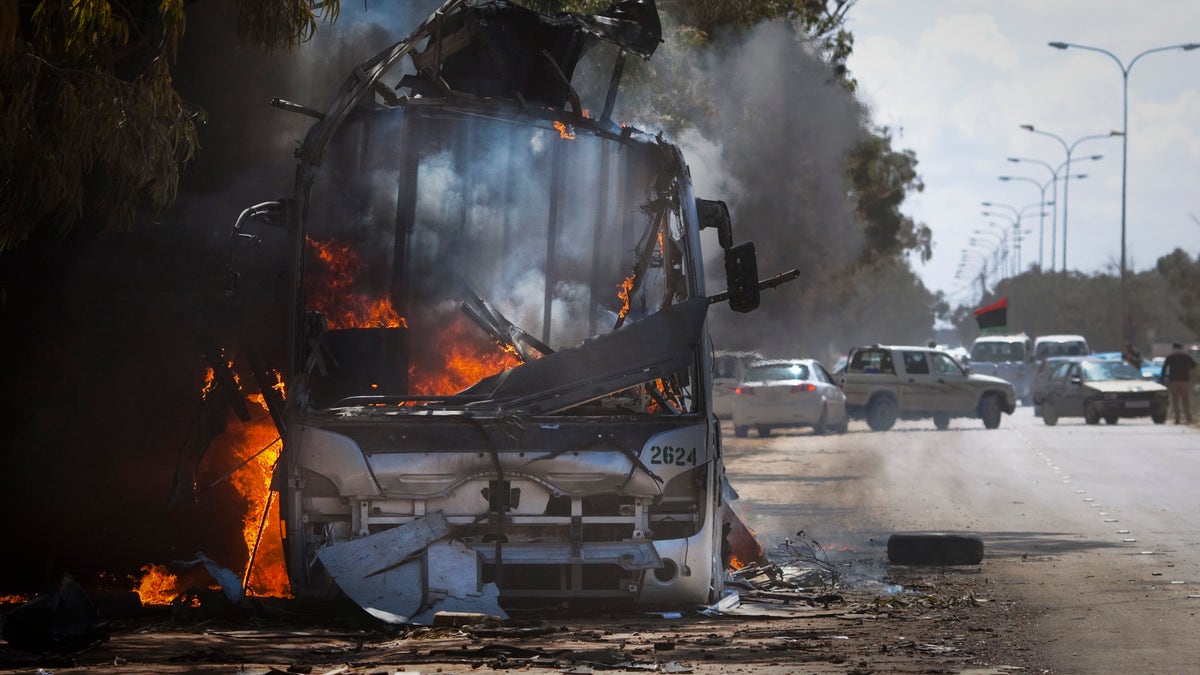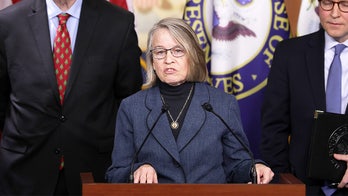
Sunday: A bus burns on a road leading to the outskirts of Benghazi, eastern Libya. (AP)
With a tight budget at home and a loosely-defined plan for action in Libya, several U.S. lawmakers say they support a no-fly zone in the Mediterranean but don't want to overspend on it, wish to avoid "mission creep" by the U.S. military and really don't know what the ultimate outcome is supposed to be.
A no-fly zone is in effect over rebel stronghold Benghazi in Libya, Joint Chiefs of Staff Chairman Adm. Mike Mullen said Sunday. But beyond that, the U.S. does not have additional plans for military action.
That has House Republicans raising questions about the benefit of the Libya operation.
"I am concerned that the use of military force in the absence of clear political objectives for our country risks entrenching the United States in a humanitarian mission whose scope and duration are not known at this point and cannot be controlled by us," House Armed Services Committee Chairman Buck McKeon, R-Calif., said in a statement.
President Obama's National Security Council on Sunday repeated the purpose of last week's U.N. Security Council resolution calling for action to prevent Libyan dictator Muammar al-Qaddafi from killing his own citizens.
"The goal of this resolution is not regime change. Rather, it authorizes the use of force with an explicit commitment to pursue all necessary measures to stop the killing. These two things aren't contradictory," said NSC spokesman Tommy Vietor.
Qaddafi has lost his legitimacy to rule, Vietor continued, but the U.S. deployment is "limited in duration and scope, and conducted in partnership with an international coalition."
"It is aimed at preventing an imminent humanitarian catastrophe that directly implicates the national security and foreign policy interests of the United States," he said.
That's not sitting well with some senators.
"We should isolate this regime," Sen. Lindsey Graham, R-S.C., told "Fox News Sunday." "This is a great opportunity to replace a tyrannical dictator who is not a legitimate leader, who is an international crook. And we should seize the moment and talk about replacing him, not talking about how limited we will be."
"We can't afford to let him stay in office," Sen. Joe Lieberman, I-Conn., told CNN.
Overall, U.S. lawmakers say they support Pentagon participation in coalition action against Libya, though they aren't confident where it will end up.
"Maybe this will be successful, but I don't see the certainty of it, for sure," said Sen. Jeff Sessions, R-Ala.
"The president is the commander-in-chief, but the administration has a responsibility to define for the American people, the Congress and our troops what the mission in Libya is, better explain what America's role is in achieving that mission and make clear how it will be accomplished," House Speaker John Boehner, R-Ohio, said in a statement.
Several Democratic senators, however, said that once the sky is free of Libyan aircraft, they are hopeful the bulk of operations will be turned over to French, British and Arab League partners.
"After a few days, there's going to be a hand-off, after the air is cleared of any threats. There's going to be a hand-off to our allies and this mission is going to be carried out by French, by British and by Arab countries," said Sen. Carl Levin, D-Mich, chairman of the Senate Armed Services Committee, who appeared with Sessions on NBC's "Meet the Press."
"There are many forces that are capable of helping," said Sen. Jack Reed, D-R.I., who was interviewed with Graham on "Fox News Sunday." "Eventually what you're going see is the Qaddafi position becomes less and less tenable, then you have an international mechanism, a special envoy to the U.N. who can move in and begin to start the negotiations."
Hopefully, Reed said, those powers will eject Qaddafi" and work with opposition elements to develop a stable government.
But Sen. Richard Lugar, R-Ind., said the United States hasn't really discovered yet "who it is in Libya that we're trying to support."
"Obviously, the people who are against Qaddafi, but who? In eastern Libya, for example, a huge number of people went off to help the Iraqis against the United States in a war that still is winding down," Lugar said.
Ali Suleiman Aujali, the former Libyan ambassador to the United Nations who resigned a few weeks ago to become a voice of opposition to Qaddafi, said Sunday that the Arab leader will never quit or surrender. That being the case, the coalition has a responsibility to protect Libyan civilians, not only those in Benghazi.
"Protection of the Libyan civilian only achieved by one goal, that Qaddafi is not there, not only by stopping his airplanes striking the people. The dangers is Qaddafi himself," Aujali told ABC's "This Week."
As lawmakers remain cautious that the U.S. will limit its role, Levin said the military, too, had been particularly concerned about "mission creep" or the possibility that in the course of the operation the military would find itself taking on more and larger roles. But they don't have that concern now because "this mission has been very carefully limited."
With the launch of Operation Odyssey Dawn getting under way eight years to the day after the start of Operation Iraqi Freedom, Lugar noted that any military mission is a drain, not only on Pentagon resources and the U.S. economy, but on the American public's willingness to intervene.
"It's a strange time in which almost all of our congressional days are spent talking about budget, deficits, outrageous problems," Lugar told CBS' "Face the Nation." "At the same time, all of this passes which is a very expensive operation, even in a limited way, always is. ... We better get this straight from the beginning, or there is going to be a situation where war lingers on, country after country, situation after situation, all of them on a humane basis, saving people."
























